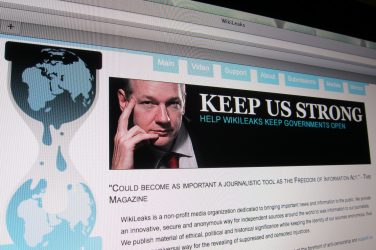Usually, politics is about being plastic, slippery, smooth-talking, and – ultimately – boring. The long labyrinthine speeches, the feckless figures and filibusters, the superfluous statistics; all this so that the dubious deed is clad in grandiloquence and the electorate’s attention is diverted with a master conjuror’s gesture. Yet sometimes this frail fabric of falseness unfolds with a thunderous facepalm moment when politicians are caught red-handed in a Freudian slip, or indeed, in a misplaced selfie. 2013 gave us Europeans many such moments. Some of the statesmen in question were previously known to have a penchant for banter (yes, we do mean Silvio B.), whereas others are debutants in the realm of the ridiculous. In no particular order, read on for four of the finest facepalm moments of last year.

The Obama, Cameron & Schmidt Selfie
Not only has the fad of taking pictures of yourself, coined as “selfie”, been added to the Oxford dictionary, but it was also been named word of the year – a fact significant in itself. Bringing political substance to this event, Barack Obama, David Cameron, and the Danish leader Helle Thorning-Schmidt took the opportunity to capture the moment with a smartphone shot. Much as it tells us how self-centred and facebook-oriented contemporary politicians are, there was one more little awkward detail: the three of them were not at some summit or another, but at Nelson Mandela’s funeral. Being the exact opposite of correctness and etiquette, and leaving a slightly bitter facepalm aftertaste in the viewer, it echoed that old Elbow song: “The leaders of the free world are just little boys throwing stones”.
Silvio Berlusconi’s Shenanigans
The notorious media mogul’s name in this list is no surprise. In the past, he has made endless political, sexist, racist, and egocentric blunders, embarrassing himself and a great part of the Italian nation in the process; has faced (and in most cases, evaded) decades-long trials and allegations of corruption; has raised significant concerns for Italian democracy; and has played the buffoon in Europe on more than one occasion. And just when you thought he couldn’t outdo himself this year, he raised (or lowered?) the bar yet again.
Having at long last lost the battle against the judiciary on two of the numerous fronts (for paying for sex with a minor, and fraud and tax evasion, respectively), he faced expulsion from the Italian Senate and a five-year ban on holding public office. In a desperate attempt to blackmail the current government, he chanted numerous threats that he and his party would vote against the government in a no-confidence vote. When the day of the vote came, however, it became apparent that not even his own party members had retained any confidence whatsoever, as he made a sharp U-turn and supported the government in a uniquely Berlusconian facepalm moment. He may have been expelled from Senate, his influence might have diminished, and his freedom – (relatively) restrained, but his recent stunts hint at his presence in next year’s list as well.
It became apparent that not even his own party members had retained any confidence whatsoever, as he made a sharp U-turn and supported the government in a uniquely Berlusconian facepalm moment.
The Bulgarian Government’s Reaction to Protests
When the seemingly impossible coalition of the Socialist, Turkish minority, and nationalist parties formed, no-one had very high expectations. Yet the appointment of a notorious media mogul for head of the Bulgarian National Security Agency after a fifteen-minute debate in parliament was an unexpected and unprecedented blunder that could only incite citizens’ protest anger.
Although the appointment was quickly withdrawn, the opaque and questionable manner of doing policies, politics, and appointments continued. Furthermore, instead of initiating a discussion with the protestors, the government acted as if they didn’t exist, as if tens of thousands of people weren’t taking to the streets on a daily basis. A massive propaganda campaign was launched (reminding older Bulgarians of pre-1989 times), aiming to misinform citizens, and to erase and/or distort current events in the media. In the Internet age, they weren’t fooling an awful lot of people – support for the protests was mounting, including from five EU Member State ambassadors (explicit from France, Germany, the Netherlands, and Belgium, and implicit from the UK). Enter a facepalm moment par excellence: the government organised (and remunerated, as journalist investigations revealed) counter-protests, artificially opposing its own citizens against each other, on occasion physically shielding the Parliament building with counter-protestors in national attire. Chic. Even though this tactic has so far worked (insofar as at the time of writing of this article the government is still in power), it will leave profound wounds in the fabric of society that will take years to heal. Recent events in Ukraine imply that the whole scenario may have been conceived by a Kremlin playwright.
The British “Don’t Come Here” Campaign
If you listen to the Tories’ banter, you’d get the impression that the UK has had quite enough of immigration this decade, thank you very much. Bulgarians and Romanians who as of 1 January 2014 have the right to work and move freely in Britain, and all other EU Member States, are just the current unfortunate targets of this verbal slaughter. Taking the chance to score easy far-right points, the British government has fuelled fears through the media and even made legislative amendments to scare off “welfare vultures”. Yet the singular facepalm moment came when a negative campaign showing the downside of British life aimed at Bulgarians and Romanians was discussed. It might have made the UK the only country in history which deliberately creates a negative image of herself. Neat, isn’t it?
Amusing as those faux pas may be, one cannot help but hope that if 2013 was the year of facepalms, selfies, blunders, and shenanigans, 2014 will be the year of reason. Chances are, however, that this time next year, there will be another edition of this list.
Cover photo source: David Precious on flickr (CC-SA)










